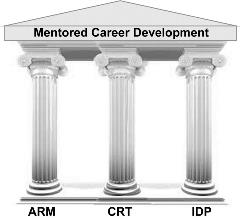Mentored Career Development (MCD) Program.
The CET has a history of recruiting and developing junior faculty members to become independent investigators. However, the traditional less structured mentoring relationships may not be adequate in preparing young faculty to thrive in the team-based multidisciplinary research environments that are increasingly common in today’s ever more complex and competitive research settings. The CET has adopted the MCD Program supported by the three foundational programmatic pillars. The central Collaborative Research Teams (CRT) pillar is flanked by lateral pillars of the Academy of Research Mentors (ARM), and the Individual Career Plan (IDP).

Using a multidisciplinary team construct, the Center seeks to identify and embed new junior faculty in a CRT under the guidance of the CET’s CRT coordinator, who oversees the MCD program. Junior faculty scholars who have been invited to participate in the MCD program receive up to $75,000/year salary support—for up to two years, with second year support contingent upon satisfactory progress.
To complement the MCD program, UTMB has developed a novel mentoring construct, the Academy of Research Mentors (ARM), in which established principal investigators with track records of successful trainees contribute their mentoring talents and experience to our MCD program. Established in 2012, the ARM answers the call for NIEHS P30 Core Centers to provide an established mentoring construct to service the career development needs of environmental health scientists of the future.
The Academy of Research Mentors (ARM), the Collaborative Research Teams (CRT), and the Individual Development Plan (IDP), are the three pillars that support the MCD program to provide junior investigators with a structured learning environment leading to independence.